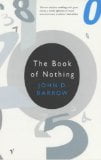 The Book of Nothing
The Book of Nothing
by John D Barrow
Vintage, £8.99, ISBN 0099288451
Barrow is a professor of mathematical sciences, and author of “Theories of Everything” and “Impossibility”.
This is a curiously substantial book about how nothing can amount to something (rather than the dire idea that nothing can amount to anything). The first part concerns the significance of zero: “The Indian system of counting is probably the most successful intellectual innovation ever devised by human beings.” Ever tried reckoning with Roman numerals? The zeros in our computers’ binary logic are, so to speak, much more than half the story. (Small numerical complaint: which nowt – archaically an oafish person – chose for a science book a font where 1 is indistinguishable from capital I?)
Here we find an amazing demonstration of how the natural numbers can be generated from the null set, and Barrow provides a very fine illustration of the null graph on p.163.
The second half discusses the nature of the vacuum. This soon leads into relativity and quantum theory, in as clear a way as one could hope for in a popular science book. It emerges that there is more to the vacuum than the mechanical difficulty of creating a perfect one: it is neither empty nor inert, “and without its powerful contribution, the unity of Nature could not be sustained”.
There is a peculiar cosmic significance for ourselves: “Universes that contain life must be big and old, dark and cold. If our Universe was less of a vacuum it could not be an abode for living complexity.” One of Barrow’s pet themes is the Anthropic Principle, although he is restrained about it here. On the other hand, for this reviewer there is rather too much space devoted to old theological ruminations about creating something out of nothing.
One last word – a gift that we might like to make use of – nullibilists: those who believe that no spiritual beings exist.
Paul Taylor



